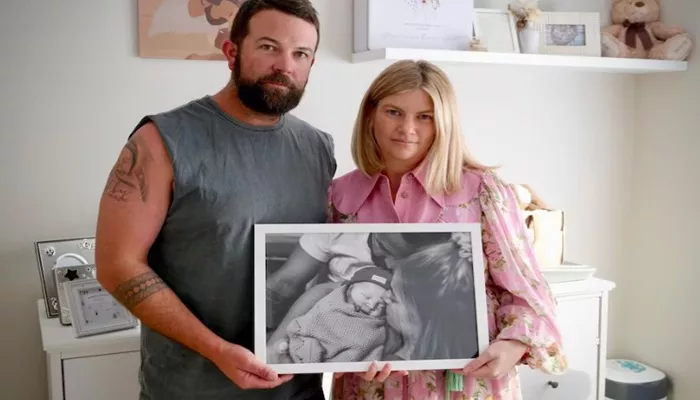This month, Bec Spreadborough should be celebrating her son Alby’s second birthday, but instead, she is mourning his death and fighting for changes in childbirth practices.
Alby passed away in February 2023 after an obstructed labour at Emerald Hospital in central Queensland. An obstructed labour occurs when the baby cannot move through the birth canal.
“One minute we were having a baby, and the next we were speaking with a funeral director,” Ms Spreadborough recalled.
Her grief has fueled her commitment to ensure other families do not suffer the same tragedy.
“I carry that on my shoulders because I don’t want it to happen again,” she said.
In the two years since Alby’s death, Ms Spreadborough has been pushing Queensland Health to review its guidelines for managing obstructed labour. She has also spoken with other women who have reached out to share their own painful experiences with obstructed labour in the state.
After Alby’s death, Ms Spreadborough learned about two separate coronial investigations into the deaths of other babies in Queensland. In both cases, the state coroner recommended better education for obstetric and maternity staff to better recognize and manage obstructed labour.
“It feels really heavy for me because I know this has happened before,” Ms Spreadborough said.
In response to a review of Alby’s death, Queensland Health has confirmed it is working on new statewide guidelines for managing obstructed and prolonged labour. Ms Spreadborough called this development a step in the right direction.
“While we might not get full acknowledgment from Queensland Health, for me, this feels like justice,” she said.
A Queensland Health spokesperson expressed sympathy for Ms Spreadborough’s loss, stating that patient safety remains the department’s top priority. The new guideline is expected to be finalized in the second half of 2025.
Experts Call for Broader Action
Dr. Doug Keeping, a retired obstetrician who delivered around 20,000 babies during his career, believes more needs to be done to make birthing safer across Queensland. He argued that a public inquiry is necessary to address systemic issues in the state’s maternity services.
“So far, it’s just been a bandaid solution,” Dr. Keeping said. “Whenever there was a problem, Queensland Health’s response was to express sympathy and apply another temporary fix.”
He also pointed out the challenges of staffing maternity services in regional Queensland, where the population is spread out. Training gaps and long working hours for health professionals further complicate the issue.
Dr. Keeping suggested a small committee, led by a judge, could provide a more thorough review of the state’s maternity services in just a few months.
Obstructed or prolonged labour, he noted, is a common challenge in childbirth. He emphasized the importance of health professionals using a “partogram,” a tool that tracks the progress of labour and signals when additional intervention is needed.
Keeping Alby’s Memory Alive
Since Alby’s birth, Ms Spreadborough has faced ongoing health complications. Severe damage to her uterus means that another pregnancy would risk a dangerous rupture. When she became pregnant with her second son, Teddy, she sought specialized care in Brisbane. Teddy was born last year.
“Parenting Teddy while still grieving is one of the hardest things I’ve ever done,” Ms Spreadborough said. “He brings me joy every day. He has a cheeky, gummy grin, and we talk about his brother all the time.”
Even though Alby is no longer here, Ms Spreadborough remains committed to keeping his memory alive.
“Alby’s legacy is important to me,” she said. “He’s still very special, and I make sure we dedicate time to remember him.”
Ms Spreadborough and her husband, Tim, have decided not to have more children, citing the trauma of Alby’s death and the health risks to Ms Spreadborough.
“This loss was too much for us, and the risks are too high,” she explained.
Related topics:


